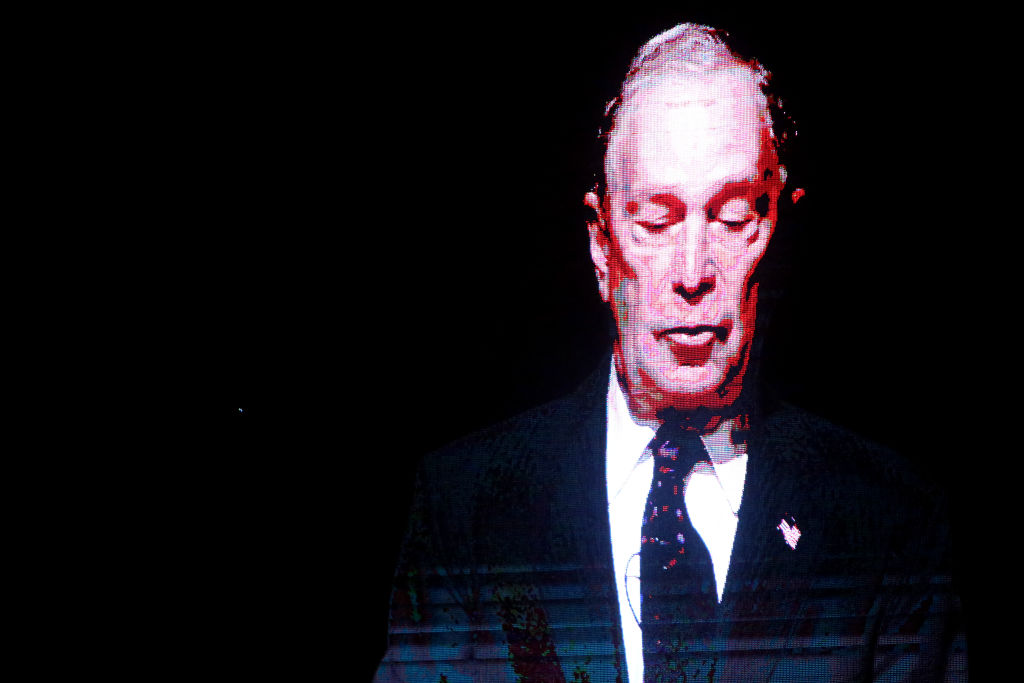If all it took to become president of the United States was massive spending on television and digital advertisements, Mike Bloomberg would win the 2020 presidential election in a landslide. As the eighth wealthiest person on the planet with a net worth of over £41bn ($53bn), Bloomberg has a practically unlimited war chest at his disposal. And he is more than happy to use it; the former New York City mayor spent £85m ($110m) in the 2018 midterm election cycle on behalf of the Democratic party.
Now that he’s officially a Democratic candidate for president, Bloomberg will be leveraging a good chunk of cash on his own prospects. The announcement of his candidacy, followed by an initial £23m ($30m) ad buy in America’s biggest media markets, is the first stage in what could be one of the most expensive primary campaigns in history.
Bloomberg, a three-term mayor and philanthropist, is a bit of an enigma in today’s Democratic party. He is at heart a pragmatist and opportunist, someone who is less about party labels and leftist ideology than cold, hard numbers.
Right now, Bloomberg looks at those numbers and sees a large portion of Democrats who want an old-fashioned moderate who isn’t about wild-eyed ideas like universal health care, free public college tuition, and extremely large taxes on wealthy individuals.
Former vice president Joe Biden could be that moderate, but his uneven debate performances and sinking poll rankings in the first two primary states have provided another moderate with a chance to steal some of the spotlight. Mayor Pete Buttigeig could be that person if it weren’t for the terribly weak support he receives from African Americans, a solid Democratic voting bloc.
As the New York Times wrote in a story on November 24, “Mr. Bloomberg’s candidacy has the potential to reshape the primary in a number of ways, perhaps most immediately by shaking up the contest to lead the Democratic party’s moderate wing.”
Indeed if Bloomberg has a shot at the nomination, it won’t be by spending time and money courting progressives, most of whom would agree with senator Bernie Sanders’ description of the New York politician as someone with “very little grassroots support,” but who nonetheless thinks that “because he’s worth $55 billion, that he can run for president.”
The amount of abuse Bloomberg has taken in the three days since announcing his candidacy is reflective of a party that disdains the rich and powerful with a passion. The Democratic presidential debates over the preceding months have been loud exercises in class warfare, where declaring battle against the wealthy is guaranteed to be rewarded with cheers.
Mike Bloomberg, who could theoretically buy a thousand miles of beachfront in the Hamptons and be left with plenty of cash left over, is at the very top of the richest one per cent. His fortune may be terrific fuel for a political campaign, but it’s not going to help the former mayor and businessman connect with a significant portion of Democrats who feel (justifiably so) that America’s political and economic system is stacked against them.
Neither will Bloomberg’s record on criminal justice be much of a help, where his support for stop-and-frisk policing in New York City disproportionately targeted minority communities and eventually led to a successful lawsuit that shut the programme down.
The ex-mayor has long insisted that stop-and-frisk got a bad wrap and remained an avid defender of it as early as this January, when he said the tactic was responsible for decreasing New York’s murder rate. The fact that he called the policy a mistake a week before launching his campaign is all the evidence you need that the two-time Democrat, Republican, and Independent understands how unsustainable his previous position was.
Mike Bloomberg’s candidacy is resting on a weak foundation. Because he doesn’t have grassroots support, he won’t be on the debate stage sparring with the other candidates or making his pitch directly. The mayor isn’t even campaigning in Iowa, New Hampshire, Nevada, and South Carolina, viewing the first four primary states as a lost investment. Instead, he will throw all of his resources into Super Tuesday, when voters across multiple states pull the lever.
Will Bloomberg’s candidacy go anywhere? It’s highly unlikely. But if there is a small morsel of hope, it depends on the amount of money he’s willing to spend; how far Biden falls; and how skittish moderate Democrats are of an Elizabeth Warren or Bernie Sanders carrying the Democrats into a viscous general election campaign against president Donald Trump.






Comments